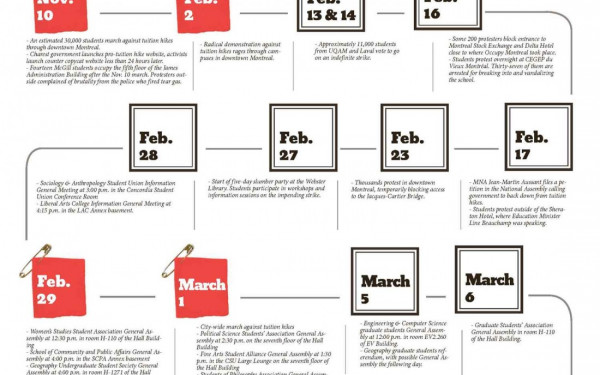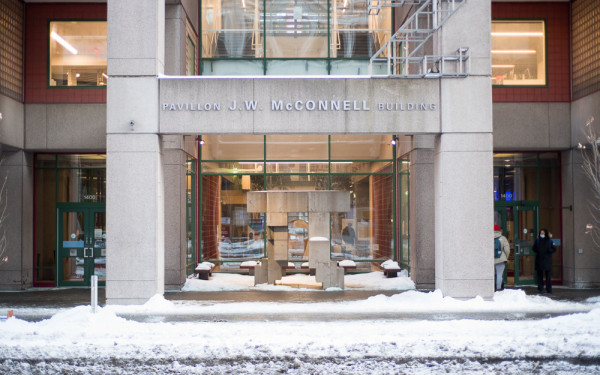“Demystifying” Student Politics
Fine Arts Students Working to Mobilize From the Ground Up
For anyone who remembers the all-red art installations and flash mobs of last spring, it’s no surprise that fine arts undergrads are some of the most visibly politically active students at Concordia.
The Visual Arts Building, its existence often forgotten by the average student, became something of a satellite strike headquarters last March, when classes were blocked and that little stretch of de Maisonneuve Blvd. became a days-long protest party.
With that in mind, it’s not all that shocking that fine arts students had the highest proportional voter turnout of any faculty in the Concordia Student Union general elections.
What’s more surprising, however, is that no candidate ran to represent them.
“There is a lack of connection between fine arts students and the CSU,” said incoming VP Student Life Katrina Caruso—the only fine arts student elected to the CSU in last month’s elections. “I personally never felt a major connection up until this year to any student government.”
While CSU council will have representation for arts and science, engineering, business and independent students, seats meant for fine arts representatives remain empty.
So while fine arts students statistically cared more about voting, the question remains why none of them wanted to sit on council.
Getting What You Paid For
“There’s this general feeling with fine arts students that the CSU doesn’t reach out to them and the events they hold don’t necessarily correspond with what fine arts students are interested in,” said Fine Arts Student Alliance VP Clubs and Services Erika Couto, who is currently a non-voting fine arts representative on CSU council along with Caruso.
After months without fine arts representation on CSU council, the union motioned in January that they’d allow non-voting representatives chosen by FASA to sit on council.
“You’re trying to represent people that come from engineering and science and at the same time trying to represent people from sociology, women’s studies and fine arts, who just function ideologically from a different position,” said Couto.
“There are definitely some people who think faculties should be left to their own devices.”
To combat that sentiment, Caruso and the rest of her executive want to bring back general assemblies to inform students of what’s going on with their union.
The plan is to include Loyola and fine arts students in these meetings by holding some of them in spaces other than the central Concordia constellation of the Hall, LB, JB and EV Buildings—like the VA Building, for example.
Caruso also suggested the idea of going into classrooms, especially those of fine arts students while they have no official union representation.
“If it’s only through council that the big issues get discussed, then that’s a problem,” she said.
Reforming FASA
While eight per cent of fine arts students showed up at the CSU general elections, less than half of that went to the polls to vote for their faculty association, the Fine Arts Student Alliance.
The alliance faced the same problem seen across the board in Concordia student politics—a lack of contested positions.
“It doesn’t seem as if it’s community organizing, but it is, and I want to emphasize that role,” said incoming FASA President Didi Ohri of the role of student government.
Ohri had little interest in student politics before last spring’s student strike. This year, she was part of the direct democracy committee, created in December to make the alliance more accessible to its membership.
The committee worked with the FASA executive, Concordia’s chapter of the Quebec Public Interest Research Group and incoming VP Academic and Advocacy Gene Morrow to create sweeping bylaw reforms aimed at decentralizing power at FASA.
“A lot of people on our current team of executives were elected on the platform of bringing direct democracy to FASA,” said Couto. She added much of that work had started last year, when there were “questionable decisions being made by the executive.”
In November 2011, FASA passed a budget that saw the executive’s honoraria be bumped up to $3,000 per semester each—doubling the president’s former salary and more than tripling the pay of vice-presidents.
These reforms make it so that honorariums must be approved at a FASA council meeting, and that they cannot exceed 20 per cent of the alliance’s budget—a maximum of $1,500 per semester each.
They also make it possible to force the resignation of councillors and executives at a special meeting with five per cent of FASA members present. The reforms see title changes too—presidents and vice-presidents are now named “coordinators.”
“It shouldn’t be six people and a small council doing what they want with student money,” said Couto. “If students don’t like what they’re doing, they should feel like they have recourse—they should have ways of impeaching their executive if they feel they’re doing a really bad job.”
Bylaws have been changed to make general meetings easier to hold, so that a simple majority can make binding decisions, instead of council expected to make all rulings. It’s a change Ohri is hoping will get students-at-large more involved in the process of allotting grant money to student projects, and “demystify” how council works.
All bylaw changes will be ratified at FASA’s annual general meeting on April 10.
The Grassroots Level
The act of accurately representing the will of those who elect you becomes a much more digestible task on the micro level. For the Concordia Association of Students in Theatre, it’s been a year of building towards being that kind of voice for its membership.
“There is a lot of laying the groundwork being done in fine arts right now […], and so with FASA’s move to direct democracy, I’m really excited to see where that goes,” said incoming CAST President Ned Zimmerman.
It’s been a transition year for CAST, whose executive only consisted of Co-Presidents Miriam Cummings and Lindsey Hubener at the beginning of the fall semester.
Along with Zimmerman, who was later voted in as CAST treasurer, they lead information campaigns on budget cuts to the fine arts faculty and the Concordia University Faculty Association’s strike mandate. They also acted as a liaison between the faculty and its students.
It’s that hyper-local approach that Zimmerman found most effective in getting students involved in Concordia politics. He says their weekly meetings now have between 15 and 20 attendees, and all five executive positions are filled for the upcoming school year.
“I’m really into the idea of smaller-scale, grassroots student organizations,” said Zimmerman. “There’s so much that needs to be done on the departmental level, that at least within theatre there’s a feeling that some students don’t want to get involved with the CSU, or even FASA.
“I think watching the ways the CSU functioned—or didn’t function—this year was pretty disheartening,” he said. “Maybe the better idea is to work locally and [see] how that can resonate outwards.”
FASA’s Annual General Meeting is happening April 10 at 6 p.m. in the CSU lounge (7th floor Hall Building).

_900_598_90.jpg)


_600_375_90_s_c1.jpg)
2_600_375_90_s_c1.jpg)
